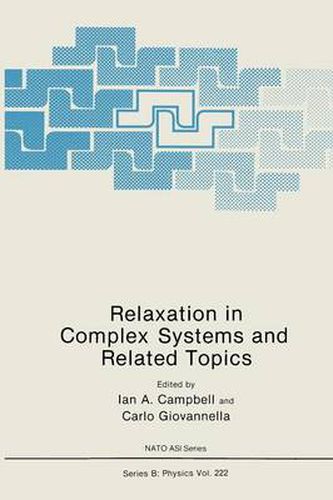Readings Newsletter
Become a Readings Member to make your shopping experience even easier.
Sign in or sign up for free!
You’re not far away from qualifying for FREE standard shipping within Australia
You’ve qualified for FREE standard shipping within Australia
The cart is loading…






This title is printed to order. This book may have been self-published. If so, we cannot guarantee the quality of the content. In the main most books will have gone through the editing process however some may not. We therefore suggest that you be aware of this before ordering this book. If in doubt check either the author or publisher’s details as we are unable to accept any returns unless they are faulty. Please contact us if you have any questions.
The aim of the workshop was to bring together specialists in various fields where non-exponential relaxation is observed in order to compare models and experimental results and to examine the general physical principles governing this type of behaviour. Non-exponential relaxation is found in extremely diverse physical systems all of which can be classified as complex. The form of the relaxation is generally parametrized using logarithmic, algebraic or stretched exponential decay forms. The conceptually simplest mechanism for the non-exponential decay is a spectrum of relaxation rates due to non-interacting units each of which relaxes with a different intrinsic time constant. Clear experimental examples can be given where for instance the relaxation of a collection of isolated polymer molecules leads to an overall stretched exponential decay. Non-exponential relaxation is observed in all strongly interacting complex systems (structural glasses, spin glasses, etc … ) where each elementary unit is in interaction with many other units.
$9.00 standard shipping within Australia
FREE standard shipping within Australia for orders over $100.00
Express & International shipping calculated at checkout
This title is printed to order. This book may have been self-published. If so, we cannot guarantee the quality of the content. In the main most books will have gone through the editing process however some may not. We therefore suggest that you be aware of this before ordering this book. If in doubt check either the author or publisher’s details as we are unable to accept any returns unless they are faulty. Please contact us if you have any questions.
The aim of the workshop was to bring together specialists in various fields where non-exponential relaxation is observed in order to compare models and experimental results and to examine the general physical principles governing this type of behaviour. Non-exponential relaxation is found in extremely diverse physical systems all of which can be classified as complex. The form of the relaxation is generally parametrized using logarithmic, algebraic or stretched exponential decay forms. The conceptually simplest mechanism for the non-exponential decay is a spectrum of relaxation rates due to non-interacting units each of which relaxes with a different intrinsic time constant. Clear experimental examples can be given where for instance the relaxation of a collection of isolated polymer molecules leads to an overall stretched exponential decay. Non-exponential relaxation is observed in all strongly interacting complex systems (structural glasses, spin glasses, etc … ) where each elementary unit is in interaction with many other units.